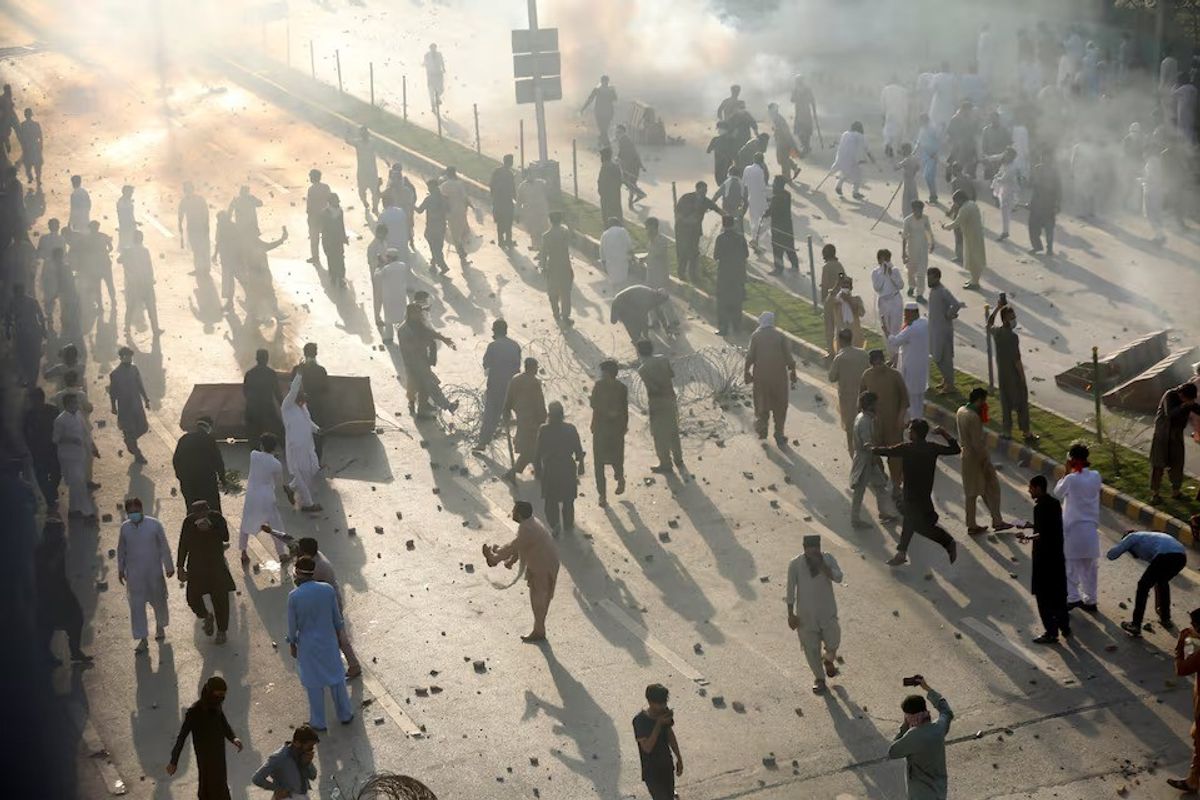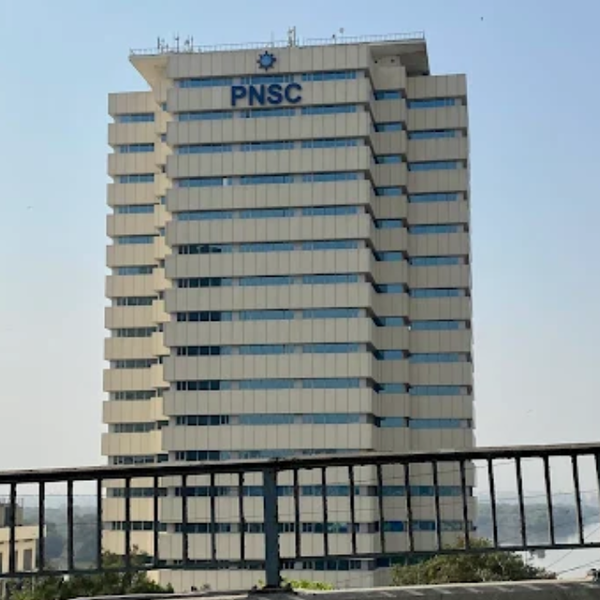Military courts in Pakistan convict 25 civilians for riots targeting military sites
The May 9, 2023 riots broke out in response to former prime minister Imran Khan's first brief arrest

Aamir Abbasi
Editor, Islamabad
Aamir; a journalist with 15 years of experience, working in Newspaper, TV and Digital Media. Worked in Field, covered Big Legal Constitutional and Political Events in Pakistan since 2009 with Pakistan’s Top Media Organizations. Graduate of Quaid I Azam University Islamabad.

Supporters of Pakistan's former Prime Minister Imran Khan participate in a protest against his arrest, in Peshawar, Pakistan, May 9.
Reuters
Military courts in Pakistan sentenced on Saturday at least 25 civilians to prison terms ranging from two to 10 years for their roles in violent attacks on military installations during the nationwide riots that erupted on May 9, 2023, following ex-premier Imran Khan’s first arrest.
The convictions were announced by the army’s media wing – the Inter-Services Public Relations (ISPR) - in a statement.
According to the ISPR, the sentences were handed down after examining all the evidence and completing the due legal process.
"All convicted criminals have the right to appeal and other legal remedies," stated the military’s media wing.
In a statement, Pakistan’s military asserted, “True justice will be served when the masterminds and planners of May 9 are brought to justice. Punishment will be given according to the constitution and law.”
Earlier this week, Pakistan’s apex court permitted military courts to announce decisions while the government’s appeal remains pending in the Supreme Court against a five-member bench ruling that declared the trial of civilians in military courts illegal.
The Supreme Court’s constitutional bench conditionally allowed military courts to pronounce verdicts for 85 civilians in custody for their alleged involvement in the May 9, 2023, riots.
The convictions
The ISPR shared details of those convicted, including Jan Muhammad Khan, Muhammad Imran Mehboob, Abdul Hadi, Ali Shan, and Dawood Khan, who were each sentenced to 10 years rigorous imprisonment for their involvement in the Jinnah House attack.
Others include Raja Muhammad Ehsan, convicted for the GHQ attack; Rehmatullah, for the Punjab Regimental Center Mardan attack; and Anwar Khan, for the PAF Base Mianwali attack, who also received 10 years rigorous imprisonment.
Further sentences include nine years for Muhammad Afaq Khan, convicted for the Bannu Cantt attack, and seven years for Dawood Khan for the Chakdara Fort attack. Faheem Haider, involved in the Jinnah House attack, was sentenced to six years.
Zahid Khan, linked to the Multan Cantt check post attack, received four years. Muhammad Ashiq Khan, also involved in the Jinnah House attack, was sentenced to four years. Khurram Shahzad, involved in the Multan Cantt check post attack, received three years.
Additionally, Muhammad Bilawal, Syed Alam, and Laiq Ahmed received two years each for their involvement in the Jinnah House attack, Punjab Regimental Center Mardan attack, and ISI office Faisalabad attack, respectively.
The ISPR emphasized that verdicts for other accused individuals will be announced upon completing their legal processes.
'Sentences a clear message'
“The May 9 sentences send a clear message to those exploited by vested interests,” the military stated. “These sentences serve as a warning against taking the law into one’s own hands under the influence of political propaganda.”
It affirmed Pakistan’s commitment to ensuring justice and the rule of law, aiming to end "misguided and destructive politics based on violence."
Cases against several accused of May 9 riots are also pending in anti-terrorism courts.
PTI rejects sentences by military courts
PTI leader and Opposition Leader in National Assembly Omar Ayub Khan has rejected sentences handed down by military courts against civilians, calling the decisions a violation of justice.
In a tweet, Ayub stated, “We reject the sentences given to civilians by military courts. Such actions undermine the principles of justice.”
He argued that the detained individuals are ordinary citizens and cannot be tried in military courts. “Military courts sentencing civilians are essentially kangaroo courts,” he said.
Ayub emphasized that military courts are not legally authorized to share judicial power with the state’s judiciary. He added that the armed forces are part of the administrative branch of the state, not its judicial system.
He criticized the establishment of such courts, saying they undermine the independence of the judiciary and violate the constitution’s principle of separation of powers.
Details of pending May 9 cases against PTI leaders
GHQ Attack Case, Rawalpindi
A total of 116 Pakistan Tehreek-e-Insaf (PTI) leaders, including Imran Khan, Shah Mehmood Qureshi, Sheharyar Afridi, Ali Amin Gandapur, and Fawad Chaudhry, have been indicted in the May 9 GHQ attack case. An anti-terrorism court (ATC) in Rawalpindi has rejected acquittal and discharge applications filed by the accused.
Three additional PTI leaders—Zain Qureshi, Raja Nasir Mehfooz, and Raja Shehbaz—were indicted today. Prosecutor Malik Naveed said three remaining accused will be indicted at the next hearing, after which the trial will begin with witness testimonies. He accused defense lawyers of delaying proceedings with "frivolous applications" over the last 18 months.
Jinnah House Attack Case, Lahore
In Lahore, an ATC has indicted several PTI leaders, including Ejaz Chaudhry, Dr. Yasmin Rashid, Aliya Hamza, and Sanam Javed, in connection with the May 9, 2023, Jinnah House attack. The trial is set to begin soon.
PAF Air Base and ISI Office Attack Case, Mianwali
In cases involving the May 9, 2023, attacks on the PAF Air Base and an ISI office in Mianwali, PTI leaders including Omar Ayub, Amjad Khan, and Malik Ahmed Khan were among 63 individuals named in the FIRs.
An ATC in Sargodha acquitted all the accused on June 10, 2024. The court ruled that the prosecution failed to present credible, consistent evidence. The judgment stated that the evidence appeared fabricated and lacked reliability to support the charges.
*With additional input from Ali Hamza







Comments
See what people are discussing